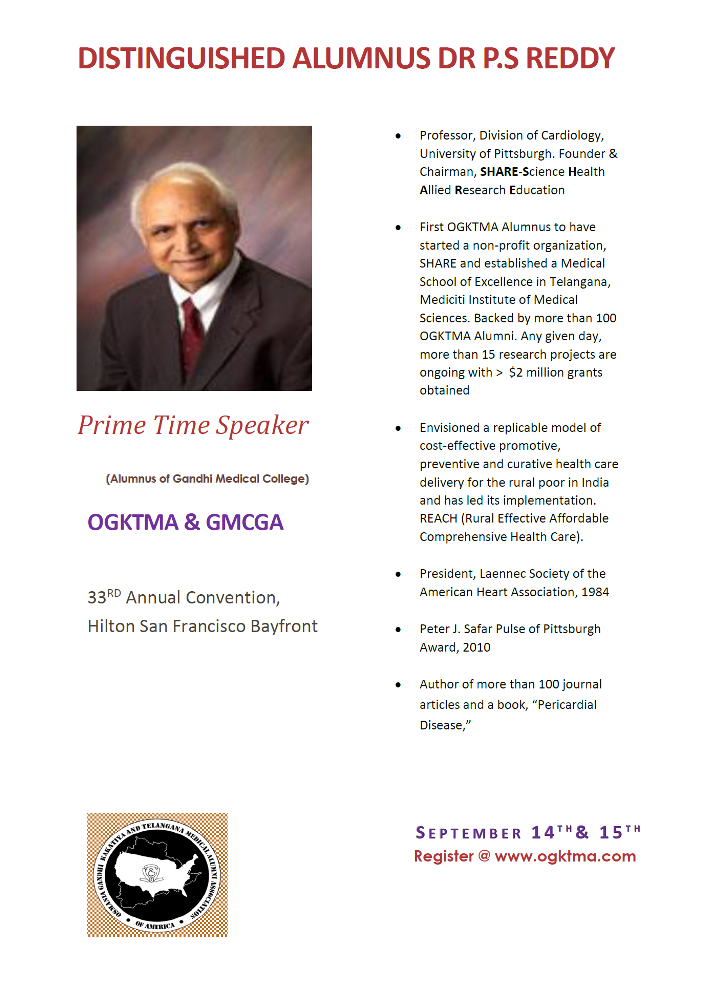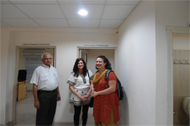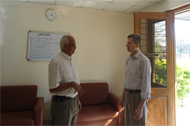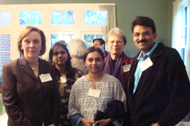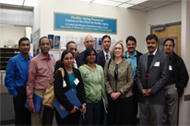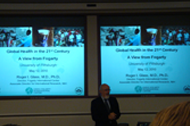“Introduction to Health Technology Assessment” Course in collaboration with New Castle University, Campbell Collaboration and SHARE INDIA
The Graduate School of Public Health (GSPH) at the University of Pittsburgh has been awarded a grant of about a million dollar from the Fogarty International Center for providing training on research methods to the faculty of the MediCiti Institute of Medical Sciences (MIMS) for a period of 5 years. SHARE INDIA has been subcontracted by GSPH to conduct training courses for the faculty in India. The aim of the Fogarty project is to develop a critical mass of non-communicable disease researchers at MIMS/SHARE INDIA. The long term goal is to develop a vibrant research culture within our institution, and to work toward stimulating and enabling the growth of research culture across medical colleges in India.
• The first training course on “Methods for Noncommunicable Disease Research” was conducted in Hyderabad during 3-7 March 2012. It was jointly organized by SHARE India and Graduate School of Public Health, University of Pittsburgh. A total of 28 members ( 20 faculty members from MIMS and 8 from other research institutions from Hyderabad) participated in the training course.
• The course curriculum consisted of introductory instruction in epidemiology, Biostatistics, data management and data analysis using EPI info and research ethics with interactive lectures and practical work with particular focus on the conduct of cross-sectional studies. The main objective of the course was to give basic concepts of research methods with a view to generate interest and skills among the participants to undertake research projects on their own. The participants were divided into 5 groups and a research topic was assigned to each group. On the final day of the training course each participant from each group presented the project proposal. Certificates of participation were awarded to all the participants.
• The Second Fogarty International Course in Research Methods in Chronic Non-Communicable Disease Research was held at Aalankrita Resort near Medchal Mandal, 2-6 March, 2013. Fourteen new MIMS faculty and associates attended. Eleven MIMS faculty who attended the course last year made presentations this year as Trainers. Seven course Facilitators, MIMS and international colleagues, participated. This year the curriculum and student projects were focused on providing the knowledge and skills to prepare a three page ICMR concept grant application. On the final day, the three student groups each made a presentation regarding the grant application which they had developed. Each application enjoyed vigorous and constructive feedback from fellow students, Trainers, and Facilitators
• The Third Fogarty Course, which was held at Leonia Resort near Shamirpet Mandal, 27-31 January 2014, was focused on manuscript preparation. About 25 faculty members from MIMS participated in the training program. Faculty from University of Pittsburgh, University of Southern California, Mahatma Gandhi Institute of Medical Sciences, Sewagram, Government Medical College - Aurangabad, KMC Manipal, CCDC, PHFI and National Institute of Medical Statistics, New Delhi, were invited as resource persons for the training course. Seven manuscripts already drafted by MIMS faculty were discussed and critically reviewed by the faculty and participants. The output of the training was revision of the manuscripts based on inputs from the faculty and participants. The course curriculum consisted of key concepts and overview of a Journal editor about how to structure title, introduction, methodology, results and discussions on the concept of IMRAD. The curriculum also consisted of some speakers giving a perspective about what readers generally expect, application of regression models, plagiarism, sampling and how to apply for research funding.
 |
 |
 |
HP and MediCiti / SHARE India inaugurate innovative new e-Health Center in Telangana.
HYDERABAD, India, 24 Feb 2014 – HP and MediCiti / SHARE INDIA, in collaboration with The Council of Scientific and Industrial Research (CSIR), today formally opened the fourth, fully integrated cloud based e-Health Center (eHC) in Aliabad , located 45 kilometers (28 miles) from Hyderabad. The site in Telangana joins existing centers in Chausala (Haryana), Myinapur (Uttar Pradesh) and Jamshedpur (Jharkhand).
In a formal opening ceremony local dignitaries and representatives of MediCiti / SHARE India and HP participated in the ceremonial blessing of the e-Health Center at MediCiti Govind Shanthi Binjrajka Rural Health Training Center (MediCiti RHTC).
In attendance were:
• Dr. K Krishnaiah, CEO, MediCiti Institute of Medical Sciences (MIMS);
• Dr. P. S. Reddy, Chairman, SHARE;
• Mr. M K Agarwal, Founder, Managing Director & CEO, GATI Ltd.;
• Dr. V Malakonda Reddy, Secretary, SHARE;
• Damanjit Sing Uberoi, Chief of Staff to the Managing Director, HP India, and
• Paul Ellingstad, Director , Human Progress Initiatives, HP Living Progress
The e-Health Center is expected to provide remote healthcare services to approximately 20,000 people across 10 villages in the district. Diagnosis and treatment will be delivered by doctors seated at a studio in MediCiti Hospital at Ghanpur Village in Medchal Mandal, Ranga Reddy District of Telangana.
The partners have transformed an existing rural health center into an e-Health Center by deploying a fully integrated cloud technology solution designed by HP. The solution will connect the medical equipment deployed at the e-Health Center with an e-Health Cloud and collect basic patient health data to enable better medical diagnosis. The e-Health Center will also provide remote consultation using built in videoconferencing options tapping into specialist expertise worldwide.
Designed to improve the access to quality healthcare in rural India, these HP cloud-enabled healthcare solutions provide health services for local people. Millions of people in India do not have access to basic health services and rural areas are especially isolated from formal healthcare. More than 65% of the population lives in rural areas, while only 2% of India’s doctors are located there. As many as 89% of rural patients have to travel an average of 8 kilometres to access basic medical treatment. The e-Health Center solution is efficient, affordable and rapidly deployable infrastructure enabling access to quality healthcare (diagnosis and primary care)
The scalability of the current initiative to other parts of India will result in robust, accessible and affordable health care services in rural areas that have limited access to modern medical equipment and personnel.
Paul Ellingstad, HP Corporate Affairs said:
“We are proud to announce the new e-Health Center here in Aliabad in collaboration with our partners. This is HP’s fourth center in India, and together we are rapidly scaling up the accessibility, affordability and equity in healthcare, particularly in remote areas where the need is greatest. Creating a better future for everyone through our actions and innovation is what we call Living Progress.”
Dr. K Krishnaiah, CEO, MediCiti Institute of Medical Sciences said: “Our goal is to help provide access to quality healthcare in rural areas and that’s why we have chosen Aliabad for the “MediCiti Govind Shanthi Binjrajka Rural Health Training Center”. We thank Hewlett-Packard and CSIR for providing innovative technology to support our goals.”
The eHC Health Cloud integrates the process of healthcare delivery and health data collection. This centralized patient information sets the platform for data-driven research such as disease surveillance by tracking disease patterns and risk factors. The health profile of the region as well as monitoring of the daily usage of the eHC is enabled by an integrated eHC dashboard, providing comprehensive yet digestible analytics that will help health policymakers.
About MediCiti Institute of Medical Sciences
Founded by a group of expatriate Indians in the USA and visionary leaders in India in Ghanpur, Medchal Mandal, Ranga Reddy Dist of Telangana during 2001-2002. A multi-specialty Hospital is attached to MediCiti Institute of Medical Sciences and trains both undergraduates and post graduates in several specialities (www.mims.edu.in).
About SHARE India
SHARE INDIA - a non-government organization (NGO) - is recognized as a Scientific and Industrial Research Organization (SIRO) by the Ministry of Science & Technology, Government of India for its work in improving healthcare awareness and facilities to the underprivileged in India through affordable community welfare initiatives. SHARE India has collaborations with University of Pittsburgh; University of Chicago; University of Illinois; The United States Centers for Disease Control and Prevention. (www.shareindia.org)
About HP
HP creates new possibilities for technology to have a meaningful impact on people, businesses, governments and society. With the broadest technology portfolio spanning printing, personal systems, software, services and IT infrastructure, HP delivers solutions for customers’ most complex challenges in every region of the world. More information about HP (NYSE: HPQ) is available at http://www.hp.com.
© 2014 Hewlett-Packard Development Company, L.P. The information contained herein is subject to change without notice. The only warranties for HP products and services are set forth in the express warranty statements accompanying such products and services. Nothing herein should be construed as constituting an additional warranty. HP shall not be liable for technical or editorial errors or omissions contained herein.
|
• Dr. Jane A. Cauley, Professor and Vice Chairman of Research Department of Epidemiology, University of Pittsburgh, made a visit to review the progress of the project MILES project which is approved by the HSC – ICMR a joint collaborative research study between the University of Pittsburgh , SHARE INDIA – MIMS.
• Dr. Clareann H. Bunker, Associate Professor, Department of Epidemiology, Graduate School of Public Health, University of Pittsburgh visited from 29th Dec, 2013 to 7th Feb, 2014 for the conduct and organising the 3rd Fogarty Research training Program. She also visited in October, 2013 also for planning on the Program also.
• Dr. B. S. Garg, Dean and Head of the Department of Community Medicine, Mahatma Gandhi Institute of Medical Sciences, Sewagram, Wardha, Maharashtra, visited on 9th Feb, 2014 for a day and interacted with our research scholars and students on 9th Jan, 2014.
• Dr. Asher Arthur Tulsky, Associate Professor of Medicine, University Pittsburgh visited from 10-15 Feb,2014.
• Dr. Catherine Haggerty, Associate Professor of Epidemiology and Co-PI for the IPVI study along with Dr. Margaret Whelan for discussion on the IPVI study from 01 March, 2014 to 8th March, 2014.
• A 3 day summit for setting research priorities for reducing cardiovascular disease burden in India was organized by SHARE INDIA (MIMS/MediCiti Hospital), Centre for Chronic Disease Control and Public Health Foundation of India in partnership with Indian Council of Medical Research (ICMR), United Health Group and Indo US Science and Technology Forum ( IUSSTF) during Feb 27-March 1, 2013.
• The objective of the summit was to define important research questions aiming to reduce the burden of CVD among Indians, identifying mechanisms for the increased risk of CVD and exploring potential collaborations to conduct large projects involving several thousand participants at multiple locations to make findings generalizable. The participants included key opinion leaders and researchers in the field of cardiovascular diseases, and representatives of research funding bodies. About 60 participants from India and abroad participated in the Conference.
• The summit covered themes that included cross sectional and longitudinal studies on CVD, studies for modification of risk factors of CVD, role of technology in cardiovascular health and research and the current registries available in India for CVD. Pace setting talks were delivered by eminent researchers to ignite each brain storming session and the focus was maintained throughout the session by moderators to facilitate and enrich the deliberations to precisely address the issues under consideration. Interactive discussions amongst the participants representing diverse backgrounds ensured a truly interdisciplinary and holistic approach to address the multidimensional epidemic of cardiovascular disease.
Address and interaction with the Students of MediCiti Institute of Medical Sciences Hyderabad , Sep 17 2012.
"Healthcare with compassion"
What we think, we become
I am delighted to address and interact with the Students and faculty members of MediCiti Medical College and other students under MediCiti Institute of Medical Sciences, Hyderabad. I am happy that the hospital and college have been created in semi-rural area of Hyderabad, which can reach every household within a 200 kms radius of the hospital with an awareness of health as a message. The MOU for clinical rotation programme at University of Pittsburg and Kentucky University will definitely provide an opportunity for the students to develop a culture of excellence and innovation in the medical profession. I congratulate the pioneers both present and past who have created a robust medical education system in this campus. My greetings to all of you. Today, when I am with you, I would like to share few thoughts on the topic"Healthcare with compassion".
Characteristics of Medical Campuses
When we study the characteristics of medical schools all over the world in terms of their mission statements, the areas of research, the facilities and the approaches to patient care, they indicate an accent on the following in the campus:
1. Atmosphere for excellence and creativity
2. Spirit of competition and collaboration
3. Emphasizing on rigorous fundamentals while stimulating innovation
4. Integrity at all levels
5. Compassion and public service
6. Inculcate the habit of becoming a life-long learner among all the students and teachers
7. Social context of medicine
8. Application of scientific principles and a multidisciplinary body of knowledge to the diagnosis, management, and prevention of clinical problems.
I am sure, MediCiti Medical College has created such an environment for the students and faculty members.
Inter-disciplinary research
Friends, Prof. Bert Sakmann - a German medical doctor and a research scientist who in 1991, together with German Physicist won the Nobel Prize for medicine for research into basic cell function and for their development of the patch-clamp technique. This technique conclusively established the existence of characteristic set of ion (+ve and ?ve) channels in cell membranes, that in turn established the role it plays in diseases like diabetes, cardiac, epilepsy and certain neuromuscular disorder.
Prof Bert Sakmann who did his elementary education in a rural background had a passion for Physics and Engineering in school days. He got interested in Cybernetics in the final year school, since he realized that living organisms could be understood in engineering terms. Thus, the seed of inter-disciplinary research was firmly rooted in him in a very young age. He enrolled himself for medical education. After foundation courses in bio-chemistry and physiology, he did his doctoral thesis in electro physiology. He attended medical schools in Freiburg, Berlin and Paris. As a doctoral student, he worked on electro-physiological basis of pattern recognition. For this, he closely worked with electrical and computer scientists. He learnt the basic mechanism of vision. Later, he ran his own laboratory in physiology in close collaboration with physio-chemical and bio-chemical departments. In his own words, he enjoyed working with fellow scientists on scientific adventures. I am sure, MediCiti Medical College will also encourage the students and faculty members to conduct inter-disciplinary research as done by Prof Bert Sakmann in partnership with leading medical and engineering institutions located in different parts of the country and the world.
Reaching the Unreached
Since, I am in the semi-rural environment, I would like to share an inspiring incident, how a MBBS doctor has put all his dreams in mainstreaming the tribal citizens of Karnataka for the last 25 years through Vivekananda Girijana Kalyan Kendra (VGKK), at BR Hills. When I visited BR Hills in 1998 and subsequently in 2006, I could see substantial new developments in that area. I could see that "New Tribal Hospital", Roads and education environment and above all the earning capacity of the tribal citizens have been increased with the technology resource centre as a base. Dr. H. Sudarshan, is the inspiring architect of this societal transformation.
Dr. Sudarshan's father died in a village without any medical help when he was just twelve. This event followed by his reading the biography of Dr. Albert Schweitzer who worked in Africa motivated Dr. Sudarshan to take up medical profession and work in tribal areas in India. Dr. Sudarshan derives his philosophy of work from Swami Vivekananda?s teachings which states "they alone live who live for others, rest are more dead than alive".
Dr. Sudarshan starts his day at 4.30 am in the morning with Yoga, meditation and prayer with tribal school children. After his breakfast at 7.30 am, he attends to administrative work for an hour. From 9 am to 1pm, he goes around the ward and sees the patients individually. He has lunch with the tribal students between 1 and 2 pm in the afternoon. Later till 7 pm, he is busy in the clinic where he conducts minor surgeries and visits tribal complex. Later, he performs administrative work for an hour and half and has dinner with the tribal students. He devotes one hour for study between 9 and 10 pm, so that he gets updated information about medical systems. He spends large part of his time in Clinical Diagnosis, Laboratory diagnosis and treatment, in addition to Supervising, Monitoring, teaching and carrying out research along with his team members.
Dr. Sudarshan pays particular attention to the special problems of the tribals such as Snake bite cases, Mauling by bears, Pneumonia, Tuberculosis and Acute Respiratory Infections. The Soliga tribal people suffer from Sickle Cell Anemia and Dr. Sudarshan has developed a low cost electrophoresis machine for diagnosing the disease. He has also built the healthcare system on the strengths of traditional knowledge available in the tribal areas. The secret of his service is that he is empowering the people to manage their own health through the provision of knowledge. He has trained tribal girls as Auxiliary Nurse & Midwife (ANM) and posted them in the Tribal Sub-centers. These nurses undergo 18 months course. Thus the rural area is self-sufficient in nursing resource. He has also developed low cost management system for Epilepsy in the Primary Healthcare Centre (PHC). He has introduced Dental Healthcare and Cancer Control in the PHC. He is providing quality healthcare to the people by the introduction of low premium health insurance for all the people living below poverty line. He suggests that medical colleges should teach their students to develop sensitivity to the suffering of the patients. They also need to modify the treatment approach for the poor who cannot afford costly treatment. The aim of the medical education should be to facilitate application of medical technology for providing best care to the poor at the most affordable cost. Dr. Sudarshan says ?the greatest joy, he experienced was when he resuscitated a patient whose lungs and heart had stopped and when he sees the smile on the face of poor patients who come to the hospital with blindness (cataract in both eyes) and walk out with full vision after the cataract surgery. Country needs thousands of Dr. Sudarshans for providing healthcare to our rural citizens. I am sure some of you may emulate Dr. Sudarshan in this noble mission.
Lead Kindly Light
I have known Late Dr. Venkatasamy for over three decades. He is known for his silent contribution and bringing light to thousands of people. All his life, he has worked for total elimination of avoidable blindness. He has brought with the Aravind Eye Hospital, the best of technology and management. He has established a network of Aravind Hospitals and also the mobile clinics. He has created many leaders in the field, who are spread in various parts of the world. Whichever eye hospital I visited in India, I met a number of people, who had been trained by Dr. Venkatasamy?s institutions. It was amazing to see how even in his eighties he was radiating enthusiasm and perseverance for realizing his vision.
Aravind Eye Hospital has been focusing on the Community Ophthalmology. Dr Venkatswamy championed the community ophthalmology service in Tamilnadu and surrounding region. This was at a time when there was tremendous amount of cataract back log, and there were not enough specialists. Using a systematic approach to mass screening and surgery he infused both science and discipline to mass surgical eye camp. The mass movement for treatment of cataract shifted from improvised operating rooms to hospital operating room facilities. Aravind has successfully integrated their core competence of community ophthalmology with modern medical treatment and research.
The Aravind has a principle that the hospital must provide services to reach rich and poor alike, yet the eye care facility must be financially self-supporting. The entire Aravind Eye care system is conducting on an average 800 eye surgeries per day and annually treat over 2.5 million patients. They are providing for every 30 paid patients, free treatment for 70 patients who cannot afford. This principle is achieved through high quality, large volume care and a well-organized system.
Aravind has grown into five hospitals with nearly 3,600 beds and 26 vision centres spread in different parts of Tamilnadu particularly in rural areas. The important aspect of Aravind system is that the productivity per ophthalmic specialists is 5 times that of national productivity. The world has recognized Aravind?s contribution. I am sure, many of you will emulate this model of treatment, care and research when you graduate from MediCiti Medical College.
These two examples of great doctors will certainly give a vision to your life. I hope every one of you will take a page today, write in a page, one sentence. That one sentence could make a difference in your life. That sentence is "What I will be remembered for?"
What we think, we become
Recently, I was reading a book about the real story of Morris Goodman. Morris Goodman is an author and international speaker. I was inspired to read about him, how mind and body combined way resulted a new life to him. Morris Goodman was crushed in an aero-plane on March 10, 1981 and he was completely paralyzed. His spinal cord was crushed, first and second cervical vertebrae were broken and his swallowing reflex was destroyed. He could not eat or drink and his diaphragm was destroyed. He could not breathe. All he could do was blink his eyes. The doctors of course said that he will be a vegetable for the rest of his life. That is the picture they saw of him, but it did not matter what they thought. The main thing was what Morris Goodman himself thought. He pictured himself being a normal person again, walking out of that hospital. He had to work within the hospital with his mind and he says, once you have your mind, you can put things back together again. He was hooked together to a respirator and doctor said, he would never breathe on his own again, because his diaphragm was destroyed. But a little voice kept telling him, breathe deeply, breathe deeply and finally he was weaned from it. Doctors were at a loss for an explanation. Morris could not afford to allow anything to come into mind that would distract from his own or from his vision. He had set a goal to walk out of the hospital on Christmas and he did it. Doctors said, it could not be done. He walked out from the hospital on his own two feet. That is a day, he would never forget. The message Morris Goodman gives to the world in six words "Man becomes what he thinks about". This aspect has been brought out very nicely in the book titled "Man the Unknown" written by the Nobel laureate - Alexis Carroll. He brought out for the first time how in medical schools, treatment deals with mostly converting pathology to physiology, whereas, the cause of pain and the disease arises out of lack of an integrating mechanism in the mind and the body. I am sure, adequate emphasis is made in the curriculum of MediCiti Medical College on this aspect of body-mind-medicine relationship.
What Can I Give
Now, I would like to share with you the noble action of two human beings about whom I came to know while inaugurating the Dialysis Center at the Kidney Federation of India at Thrissur, Kerala, last week.
The nutrient of the mind is in the action of 'Giving': First personality is Rev Fr Davis Chiramel from Perincherry, Kerala. Fr Davis Chiramel donated one of his kidneys to an electrician, Shri Gopinathan, after he heard of his suffering through media
Another personality I met is a special person. His name is Shri Kochouseph Chittilappilly and he is a well-known industrialist in the field of electrical equipment, construction and services in the state and the nation. In 2011, in a touching gesture of giving, Mr. Chittilappilly donated his kidney to an unknown ailing poor truck driver. This set in motion a unique movement called, "The Kidney Chain", wherein a relative of one patient would donate to another patient, whose relative will in turn donate to another and so on. Moreover, about 500 employees of his company pledged to donate their organs after death.
I told them that I was very happy to sit next to two great souls. I asked them, "What made you to give one part of your system and bear the suffering and pain you had to go through in the process. Above all, God has created two kidneys for a human being for some reason, and you are not afraid to lose one of them. Please tell me, how your mind and body cooperated in such a situation of physical agony to self to rid the pain of someone else?"
Father Davis said only four words, "It is God?s Wish." Whereas my other friend Chittilappilly said, "I am a well to do industrialist. And I have everything what I need. There is an urge in my mind that I must derive some happiness on some act what I was going to do. God led to the path of giving my kidney to an unknown truck driver". When I studied both the givers, in detail, biological side, mind side and the type of pain they had to go through and the fulfillment they had after bearing the pain and removing the pain of the electrician and truck driver. I am sharing this experience that will make us realize, that human mind and body is highly complex and we are all integrated physiologically and psychologically and would need nurturing both of them uniquely for a happy living. I am sure, all the students and faculty members will develop this nutrients in their minds which creates an urge "What Can I Give" that will make the entire neighbourhood of Mediciti healthy and disease free.
Conclusion : Six virtues a care giver must possess
Friends, now I would like to share an experience with Choakyi Nyima Rinpoche, the Chief Monk in Kathmandu and a medical researcher. After nearly a kilometer of walk, I reached the white Kumbha where the chief Monk and his disciples were waiting to receive me. After reception the Chief Monk said, let us go to our study room and I followed him. He climbed the first floor, the second floor, the third floor, the four floor and the fifth floor, just like a young boy. Probably the life style has a positive impact on the mind and body. All along I was following and following. When I reached his chamber, I saw a laboratory and a spiritual environment over-looking the Himalayas. What surprised me was, his research students come from different parts of the world. Particularly he introduced me to his co-author David R Shlim, MD who is working on a research area, Medicine and Compassion. The Chief Monk Choakyi Nyima Rinpoche and myself exchanged few books. The Monk has written with Dr. David R. Shlim a book titled "Medicine and Compassion". I liked this book and read it during my journey from Kathmandu to Delhi. This book gives six important virtues which a medical practitioner has to possess towards their patients.
First virtue is generosity; the second virtue is pure ethics; third is tolerance, fourth is perseverance, fifth is cultivating pure concentration and the sixth virtue is to be intelligent. These virtues will empower the care givers with a humane heart. I am sure, the students of MediCiti Medical College will cultivate all these six virtues as a habit while dealing with the needy patients.
My best wishes to all the students and faculty members of MediCiti Medical College and other students of MediCiti Institute of Medical Sciences, Hyderabad success in their medicare mission.
May God Bless you.
Oath for medical professionals
1. I love my medical profession a noble mission.
2. I will follow the motto "Let my care, remove the pain and bring smiles".
3. I will always radiate cheer to give confidence to patients and their families.
4. I will be a life-long learner, I will practice what I learn and I will train my team to be competent.
5. I will deliver quality care with high standards irrespective of whom I am treating.
6. I will not introduce any diagnostic pain.
7. If any patient is unhappy with my treatment, I will find out the causes and treat the patient with utmost care, free of cost.
8. I will work with integrity and succeed with integrity.
9. My National Flag flies in my heart and I will bring glory to my nation through my professional excellence.
Methods for Non-Communicable Disease Research,
Fogarty International Training Course,
SHARE INDIA-MediCiti Institute of Medical Sciences
University of Pittsburgh – Graduate School of Public Health,Hyderabad, A.P. India , March 03 – 07, 2012 (40 hours), Alankrita Resort, Tumkuta.
Sponsored by:
SHARE INDIA Research Foundation and the
Department of Epidemiology, Graduate School of Public Health, University of Pittsburgh
With support from the Fogarty International Research Training Award: Chronic, Non-Communicable Diseases and Disorders Across the Lifespan (SHARE India University Pittsburgh Population and Intervention Research Training [D43 TW009078])
Target Audience: Faculty, Mediciti Institute of Medical Sciences (MIMS), Ghanpur Village, A.P., India. This is an intense residential course for highly motivated people wishing to do research. All Attendees and Course Faculty are expected to arrive Friday night and depart Wednesday night.
| Faculty | Facilitators |
PS Reddy, MD (Cardiology) |
Jammy Rajesh, MBBS, MBA |
Patti Gravitt, PhD (Epidemiology) |
Ranjeeth Paul |
Clare Bunker, PhD (Epidemiology) |
Tushar Singh, MD |
K Balasubramanian, PhD (Demography) |
Jamie Eastman, MPH |
Prakash Shrivastava, PhD (Physics) |
|
Rashmi Pant, Ph.D (Statistics) |
|
Course goal: To contribute to the development of a critical level of research expertise at MIMS.
Course format: Introductory instruction in in epidemiology, biostatistics, data management (EpiInfo), data analysis (EpiInfo), and research ethics via interactive lectures and practical laboratories with particular focus on the conduct of cross-sectional studies.
Course objectives:
Upon completion of the course, the student should be able to:
- Epidemiology: read and understand the scientific literature regarding non-communicable disease research; read and interpret graphs and figures; calculate and interpret prevalence and incidence rates; develop appropriate study design; formulate hypotheses; understand measurement and reliability issues related to exposures and endpoints; understand concepts of bias, confounding and interaction; calculate simple measures of association; weigh evidence for association.
- Biostatistics: understand basic procedures of exploratory data analysis and data cleaning; understand concepts regarding the normal distribution including mean, standard deviation, and 95% confidence interval; understand basic concepts of sample size calculation, and the gathering of parameter estimates required for sample size calculation, from literature or preliminary data; understand concepts underlying simple hypothesis testing involving means (independent and paired t-tests) and proportions (2 X 2 tables, chi square).
- Data management (EpiInfo): create a simple questionnaire with properly documented variables in EpiInfo; enter data; run descriptive analyses including histograms; identify outliers and improbable data; clean data; graph data; test simple hypotheses regarding means and proportions.
- Research ethics: understand ethical norms for adherence to research protocol; understand concepts of protection of human research subjects including respect for persons/autonomy, beneficence, justice; understand the concept of plagiarism; understand appropriate collaborative behavior; understand the components of a research protocol and consent form for submission to the Ethics Committee; complete the Johns Hopkins University (JHU) human subjects research certification process.
Principal text: Leon Gordis, Epidemiology, 4th edition, 2009, Saunders Elsevier, Philadelphia.
Recommended texts:
Dan Mayer, Essential Evidence-Based Medicine, 2004, Cambridge University Press, Cambridge
CDC, Principles of Epidemiology in Public Health Practice, 3rd edition, http://www.cdc.gov/training/products/ss1000/ss1000-ol.pdf
|
BUILDING RESEARCH CAPACITY THROUGH PARTNERSHIP AND MENTORING: THE SHARE INDIA AND UNIVERSITY OF PITTSBURGH COLLABORATION
MAY 10 – 12, 2010, UNIVERSITY CLUB, GOLD ROOM, PITTSBURGH, PA, USA.
Since the initial global health research conference in December 2007, SHARE INDIA and the University of Pittsburgh have initiated several collaborative pilot projects, and there is now a vigorous and growing collaboration between our institutions.
The broad objectives of the second Global Health Conference, “Building Research Capacity through Partnership and Mentoring” are
- Refine and strengthen the current projects,
- Foster new collaborations between researchers at the University and SHARE INDIA, and
- Develop strategies for securing extramural funding.
The conference was opened with an overview of SHARE INDIA, its affiliated organizations, and available research resources. Faculty from the University and SHARE INDIA, MIMS, Hyderabad, described their current research work during project-specific sessions.
Breakout sessions had served as a venue for participants to discuss the existing projects, build new collaborations, and brainstorm about new research opportunities and extramural funding streams.
The following members actively participated in this conference.
SHARE INDIA
Dr. P.S. Reddy, Chairman, SHARE
Dr. K. Balasubramanian, Associate Director - Research
Mr. R. Purushotham Reddy, Data Manager, Research
Dr. Ganesh Oruganti, Director, PHMI
Dr. Jammy Rajesh, Associate Director –Research, PHMI.
MediCiti Institute of Medical Sciences - MIMS
Dr. K. V. Raghava Rao, Principal
Dr. K. Govindrao, Associate Professor, Dept. of Community Medicine
Dr. B. Kalpana, Associate Professor, OBGY
Dr. P. Satyanarayana, HOD, Central laboratory
Dr. B. Poornima, Tutor, Dept. of Community Medicine.
The discussion focused on the existing and future research on pregnancy, birth outcomes, hormonal disorders (including thyroid and diabetes), cardiovascular diseases, bone disorders, infectious disease, psychiatry, gender issues, molecular epidemiology, and aging.
